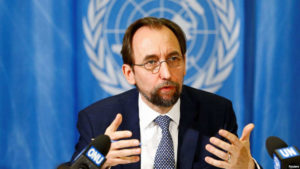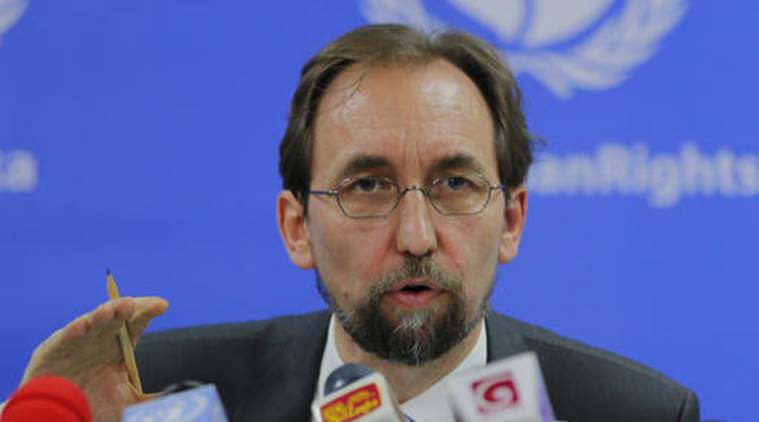Al Hussein has been in the news recently over his frank criticism of India, ranging from Delhi’s threat to deport its Rohingya refugees back to Myanmar where it is facing ethnic cleansing, to the “broader rise of intolerance” towards religious and other minorities as well as “worrying developments” in Kashmir.

 United Nations High Commissioner for Human Rights Zeid Ra’ad al-Hussein. (AP/File Photo)
United Nations High Commissioner for Human Rights Zeid Ra’ad al-Hussein. (AP/File Photo)
As India prepares to respond to as many as 340 recommendations made by the international community at the Human Rights Council’s third Universal Periodic Review in Geneva today (September 21), it has emerged that a highly critical letter of India’s human rights record, written by UN high commissioner for human rights Zeid Ra’ad Al Hussein to external affairs minister Sushma Swaraj in April, took as long as four months to reach the National Human Rights Commission (NHRC) for action.
Al Hussein has been in the news recently over his frank criticism of India, ranging from Delhi’s threat to deport its Rohingya refugees back to Myanmar where it is facing ethnic cleansing, to the “broader rise of intolerance” towards religious and other minorities as well as “worrying developments” in Kashmir.
“The current wave of violent, and often lethal, mob attacks against people under the pretext of protecting the lives of cows is alarming,” the High Commissioner for Human Rights had said as he inaugurated the 36th session of the Human Rights Council in Geneva on September 11.
But Zeid Al Hussein, who is married into the Jordanian royal family, has been watching India’s human rights record for some time. On April 12 he wrote to Sushma Swaraj, recommending that the NHRC’s powers be expanded to “cover all relevant cases involving the paramilitary forces and the army, including in Jammu & Kashmir state,” as well as empowering it to “inquire into alleged human rights violations and abuses by the armed forces of India.”
The letter, which is essentially an intermediate response to NHRC’s application for reaccreditation to the ranking Global Alliance for Human Rights Institutions (GANHRI), has several other suggestions on what India can do to strengthen the NHRC.
It seems that GANHRI’s sub-committee for accreditation had last November warned India that the NHRC must be much more diverse and representative in its make-up, so as to suo moto credibly deal with the country’s human rights record.
Zeid Al Hussein’s suggestions include, establishing an open, transparent and merit-based selection process” for the NHRC’s governing body; appointing an advisory council, drawn from the NGO community and civil society, to its governing body, albeit without voting rights; empowering the NHRC to issue its own rules of procedure and guidelines; and establishing NHRC offices in the east, west and south of India and providing it funds to carry out its mandate.
But as Chennai-based human rights activist Henri Tiphagne found through two RTI applications, to the MEA and to the NHRC in July, Zeid Al Hussein’s letter to Sushma Swaraj – with copies to then vice-president and Rajya Sabha chairman Hamid Ansari, Lok Sabha speaker Sumitra Mahajan, Home minister Rajnath Singh and NHRC chairman H L Dattu – took as long as four months to reach from South Block, which houses the MEA, to all these offices just down the road.
In an RTI application to the NHRC on July 8, Tiphagne asked about the contents of Al Hussein’s letter, when it had reached and what action the NHRC was taking in this regard. Within ten days, the NHRC had replied saying it had received no such letter from the MEA.
A day earlier, on July 7, Tiphagne had filed a similar RTI with the MEA, with the same questions. Six weeks later, on August 22, he finally received a reply from the MEA, enclosing a copy of the letter.
The UN High Commissioner for Human Rights, it turned out, had written his letter to Sushma Swaraj on April 12 and sent it to India’s mission in Geneva, which in turn had forwarded it to Delhi.
At the Human Rights Council meeting today, where India’s case will come up, NHRC member J S Koccher will be present on behalf of his organization, along with MEA officials from Delhi as well as Rajiv Chander, India’s representative at its mission in Geneva.
Old-timers recall the time in 1993, in the wake of the Babri Masjid demolition, when then prime minister P V Narasimha Rao had sent then leader of the opposition Atal Behari Vajpayee to lead India’s delegation at the Human Rights committee meetings in Geneva.
This time around, with big powers like the US themselves under considerable international scrutiny on their own rights record, Delhi believes it can brazen it out. The day after the Al Hussein’s criticism of India in Geneva on September 11, Rajiv Chander responded by quoting prime minister Modi’s “sabka saath/sabka vikas” slogan to the Human Rights Council.
Then he added : “It is surprising that individual incidents are being extrapolated…India is proud of its independent judiciary, freedom of press, vibrant civil society and respect for rule of law and human rights. A more informed view would have not only recognized this but also noted, for example, that the Prime Minister himself publicly condemned violence in the name of cow protection.”
Of the 340 recommendations made by the human rights community to India, several deal with revising the AFSPA (Switzerland, Pakistan), enforced disappearances and impunity of security officials (Japan, Kazakshtan, Greece), equality to same-sex minorities (Ireland), anti-conversion laws (Vatican, Italy), freedom of religion and belief (Pakistan, Germany, Canada, Korea), refugees and stateless people (Kenya, Slovakia), protection of migrant workers (Guatemala, Uruguay), etc.
Interestingly, the need to amend the FCRA so as to allow freedom of association as well as the attendant rights of freedom of speech and expression have been brought up by several countries – Germany, US, Korea, Norway, Czevh Republic and Switzerland.
India’s refusal to ratify the convention against torture, even after two decades, troubles several others — including Portugal, Germany, Botswana, Norway, Czech Republic, Bulgaria, Australia, Japan, Kazakhstan, Korea, Israel, Chile, Burkina Faso, Russia, Denmark, Indonesia, Estonia.http://indianexpress.com/article/opinion/india-on-the-mat-at-geneva-human-rights-meet-4854098/